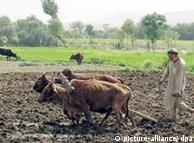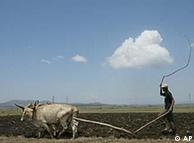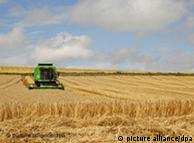AGRICULTURE | 17.02.2011
Farmers solve problems agro-industry ignores, Slow Food founder says
In his book "Terra Madre," Carlo Petrini promotes the creation of "food communities" that connect the people who produce food with the people who buy it. He told Deutsche Welle that more support and respect should to be given to small-scale farmers.
Deutsche Welle: In your book you connect pleasure with dignity and respect. Why do these three ideas belong together?
Carlo Petrini: These things have been going hand-in-hand forever. Pleasure is a prerequisite for our ability to respect what we eat and for us to treat the people we encounter with dignity and respect.
Your critics have accused you of emphasizing the value of taking pleasure from food in a world where a billion go hungry.
These critics have been misled into thinking that taking pleasure from food is a privilege for the rich. Enjoying food is not just for snobs or the wealthy; it's a right all people are entitled to. Even in poor countries, where our movement is strong, in countries where there are problems with malnutrition, and hunger, people can prepare simple meals that provide each other with pleasure.
Terra Madre is made up of what you call "food communities" that connect the people who produce food with the people who buy it. How do the communities work?
Terra Madre is a mesh of communities dealing with food that share a common set of goals: they fight for maintaining biodiversity, for small-scale farming and for protecting the environment. The there are at least 6,000 such communities in 163 countries and they're held together by a strong sense of anarchy rather than the rules that would govern an official association.
Like you, the UN's Food and Agriculture Organization and other groups have pointed out the importance of small-scale farming in feeding the world's growing population. Do you think movements like Terra Madre can replace large-scale food production when it comes to feeding a projected world population of 9 billion people?
I think that both large and small-scale production methods need to work together. We can already see that small-scale farmers are able to solve the problems that the agriculture industry isn't interested in dealing with. Local farmers know the region and have roots there, they take a pragmatic approach to the circumstances they face. That's why is so important to protect them. Everyone pays lip-service to the protection of small-scale farmers. But then it's also often repeated that we need to rely on industrial food production because of global hunger. I say this approach is backwards. It can't be only large industry, instead everyone has to work together. Small-scale farmers need special protection and support because they are the weakest. That's one of Terra Madre's main concerns: defending food producers.
In your book, you describe the situation for farmers in India who have to buy new seeds every year and end up taking their own lives because of their massive debts. What can be done to help the farmers who aren't able to live from their land?
In the places where these suicides occur we have noticed the dominance of industrial food production. Production that relies on chemicals and genetically modified organisms. That's why the small-scale farmers there suffer so much. They've been caught in the perverse grip of the large-scale agriculture industry. At the other end of the spectrum we see small-scale farmers who have close ties to local farming practices. In these places there are lots of small communities that are able to live and survive from their work. I learned about such a community in India where 100 women created an organic farming network and even spread information and advice using their own radio broadcasts. Terra Madre also wants to show young people that it's possible to return to the land and that their creativity and intelligence could introduce a real process of change.
But more young people are moving to cities where they think they have better chances at improving their lives.
That's one of the main points that need to be addressed. How can we keep these people from moving to cities? Urban environments offer young people a more social life with different types of attractions that aren't available in agricultural areas. Some organizations believe that people will return to farming if economic changes are made and faming becomes more sustainable. But that's not enough. For example, in Brazil, I've seen how people flood Sao Paolo only to end up living in the poorest of conditions. It's not enough to make economic changes. Instead we need to expand social life outside of urban areas. It has to be possible to visit a theater or see a movie without having to be in a city.
When you had the idea of a slow food movement some 25 years ago it was set in contrast to fast food. Now we're living in a world with broadband Internet and smart phones and it seems that life is constantly speeding up. How do you judge the current conditions for promoting a slower lifestyle and considered thought?
There is no absolute value to going slowly. Slowness should be enjoyed in homeopathic doses. The important thing is that we decide the rhythm we live by for ourselves. Terra Madre started by addressing food and it's served as a launching point for discussions on agricultural and environmental policies. Food is often seen just as an ingredient in our lives. But that's wrong. Food gives us energy for life; we can only live because we eat. Terra Madre and other movements have embraced the view that the food we eat is at the heart of political issues - even if politicians don't realize it. The humble and modest around the world know that food is central to issues of social justice, of environmental protection and with respect for others.
Interview: Anke Rasper, translated from Italian by Johannes Hampel / sms
Editor: Stuart Tiffen
dw






No comments:
Post a Comment